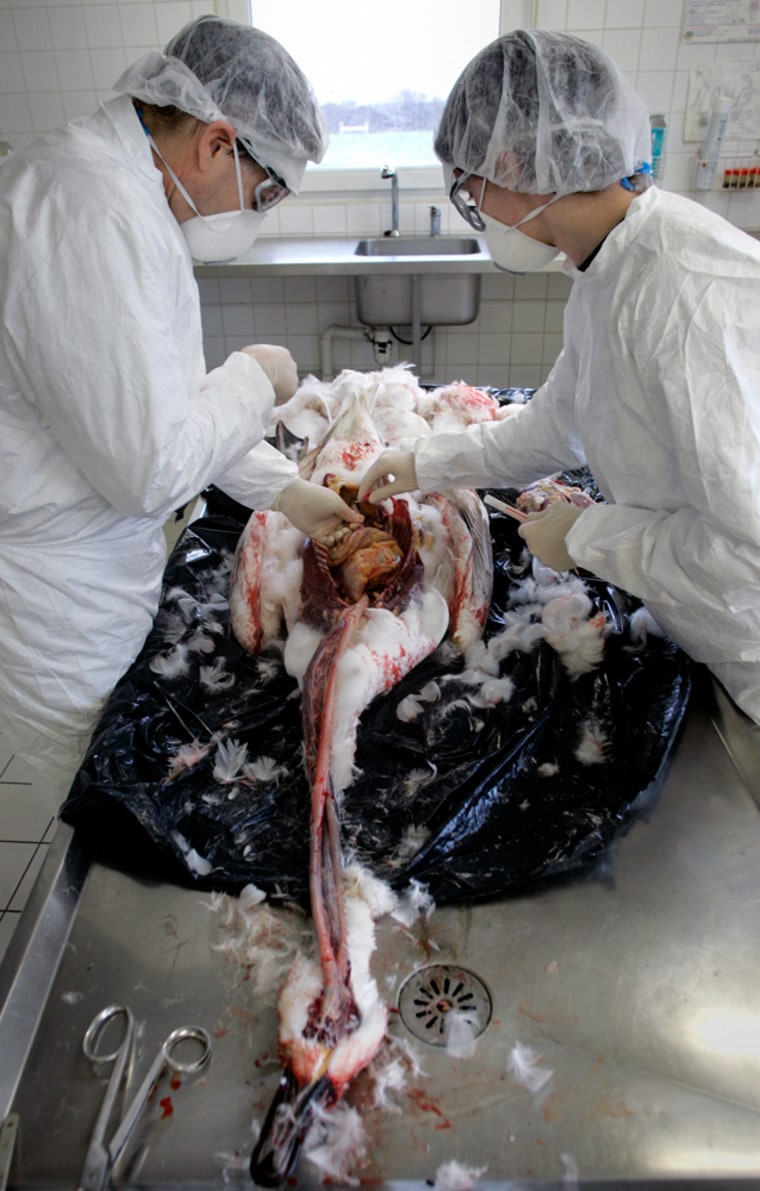The European Union urged its trading partners on Saturday not to overreact to an outbreak of bird flu in France after Japan suspended all French poultry imports and threatened a similar ban on the Netherlands.
Japan’s move caused alarm in Europe’s two biggest poultry producers after tests confirmed the deadly H5N1 strain of avian flu had hit a farm in eastern France, the first case of the virus in domestic farm birds in the EU.
“Whilst I understand their decision to take precautionary measures, any action must be proportionate,” EU trade commissioner Peter Mandelson told Reuters during a visit to an annual farm show in Paris.
“There can be a tendency to over-react and this can bring us much danger,” he said.
Confirmation of the H5N1 strain in France, at a farm where thousands of turkeys have died or now been culled, threatens to deal a severe blow to France’s poultry industry, worth $7 billion a year and the biggest in the 25-nation EU.
The Netherlands is the next biggest European producer, with exports of live birds, meat and eggs worth about 1.5 billion euros a year.
French President Jacques Chirac, a former agriculture minister, sought to quell growing panic after meeting farmers and veterinarians at the Paris farm show, where no poultry are on display this year because of health concerns.
“Unfortunately you can see a completely unjustified sort of total panic developing,” said Chirac, who also briefly met Mandelson. “There is no danger in eating poultry and eggs.”
Poultry sales in France are already down by about 30 percent and panic has grown since bird flu was discovered on Thursday at the farm with 11,000 turkeys in the Ain department, a region where two cases of H5N1 have also been confirmed in wild ducks.
Consumer fears in Japan
The virus is highly contagious among poultry and can spread through an entire flock in hours. It remains difficult for humans to catch but has killed more than 90 people worldwide.
The virus has spread from Asia to Africa, and experts fear poultry in more regions around the world could soon be infected.
Japan imposed a temporary ban on French poultry on Friday, hours before the H5N1 strain was confirmed in France.
The Dutch farm ministry said on Saturday Tokyo would implement similar action against the Netherlands when it starts a preventive vaccination program. Japanese consumers fear a possible health risk from vaccinated animals.
“They haven’t imposed a ban yet but they say they will do so when we start vaccinating commercial poultry,” said ministry spokesman Benno Briggink.
The Netherlands plans to vaccinate its 1 to 3 million backyard poultry and about 5 million free range poultry in about 10 days. Dutch farmers have said they will reject vaccination if they are not able to export.
France also has permission from the EU for a limited vaccination program in geese and ducks in three departments in the west of the country though at risk from migratory birds. Two of the departments have rejected the option to vaccinate.
A security zone of two miles and a surveillance zone of five miles has been set up around the farm where the deadly strain was discovered.
20th human victim in Indonesia
Under EU rules, poultry meat, eggs and products from the zones set up around a bird flu infection site are blocked from the market, except for certain products that meet stringent conditions, such as heat-treated meat.
However, trade in these products may continue from other non-affected parts of the country.
In Jakarta, a health ministry official said on Saturday that bird flu had killed its 20th human victim in Indonesia. The latest victim was a 27-year-old woman, according to tests by the U.S. Centers for Disease Control and Prevention in Atlanta.
The woman died last Monday after being admitted to the Sulianti Saroso hospital in Jakarta. A hospital spokesman had said the woman had contact with dead chickens.
Indian authorities have found H5N1 in chickens in the western Gujarat state, which neighbors the state of Maharashtra where the first outbreak in poultry was reported.
So far most victims of bird flu globally have had direct or indirect contact with chickens, but there are fears the virus will mutate into a strain easily passed among people, causing a pandemic in which millions could die.
